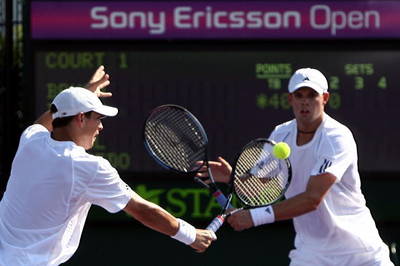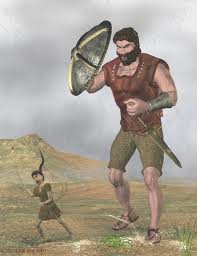"Parental force was the reason I went to tennis"
- few regret it.
As a child you experienced force, some measure of it. Parents have to force certain things - brushing your teeth, doing your homework, finishing up your plate. You can't deny that it did you some good.
A good many of us become parents in our lives. How instrumental are we really at focussing our child on his development, at making him understand why we insist on certain things?
I have to confess I’ve been very lucky. My children have been healthy and happy, haven’t got into too much trouble, and they’ve both achieved plenty. And they are both effectively gone, out of the house. My work as a parent is over. I can look back and reflect on all of that.

Ticking clock
How do I know I’ve been lucky? That’s easy. I have a lot of contact with children of all ages, and I know that these others could never be my children. Much as I love all children, I notice differences. I didn’t expressly mean to do it, but I’ve instilled my way of doing things into my own children. What’s turned out is pretty much what I had in mind.
An influential adult
So have I achieved this by force? Maybe only a person from the outside can really judge this, but I would say I have forced it. I have committed great energy into my children, set certain rules that I insist on, and encouraged them to develop in a certain way. Their development has been by no means free. It has followed my way of doing things.
This sounds terrible. Deliberately, apparently, I have created children that are approaching clones of me. (Let’s not forget the input of my wife, but I’d like to give my opinion first!). But there’s the first problem. Even if I can see elements of my children’s behavior that is clearly from my input, they are by no means clones. In fact, if they were clones, possibly parenting would have been a good deal easier. I can identify things that they do better, worse, differently to me.
A step up
Nothing pleases me more of course, than to see them do things better than me. For example, my daughter out-performed me by a mile in her university studies. She had the same methods and dedication that I had, but her natural drive is more focussed, better organized, than mine. Maybe there are reasons for this. Maybe, through my input as a parent, she could see she could be more focussed at university than I myself was. I’d like to think this fanciful idea. I have absolutely no proof that this is true.

A common theme to my notes is tennis. My son hits balls better than me. When I play tennis with him I don’t know whether to whoop, giggle or cry with joy, because it is just so good. I’ve seen myself hit balls, and I know he’s got the edge on me. Once again, maybe through my role as a parent I have given him the freedom, the information, the opportunity, to go further than me. Maybe if I had had similar input as a child I would have hit the ball like him. Once again, no proof, none whatsoever. I’m just a proud parent seeing his child outdo him.
I’m not here to say whether my children are as proud of being able to outdo me, as I am of them. It’s not the question. But I know I have definitely forced the issue. My daughter wouldn’t have gone to university where she did, if she hadn’t have been my daughter. My son wouldn’t have achieved this special ball-striking without me dragging him round tennis courts for five years of his life.
Excessive force
Has my force been excessive?
In another article I have mentioned a neighbor who is a pedagogical specialist at university, who claims that children should not be pushed to perform. In disbelief I have asked him why, pedagogically, this is the right way for a parent to go about things. He says that a child, in any case, will watch what you are doing, and copy you, or not. This suggests that my daughter would have come to her studying performance, my son to his ball-striking, automatically. Possibly this is because it is in their genes anyway, or in their environment anyway. My neighbor says that there is empirical proof for this. I’m not sure, but I’m ready to believe him.
The above example is one of a totally non-committed parent. All the other pre-requisites may be there, the bedtime stories, bottom-wiping, the scolding. But there has been no deliberate focusing on any one talent, or activity. The reason why I doubt my neighbor is that I believe it is unavoidable to influence your child’s interests. Further, it is unavoidable to influence your child’s interests in a positive, or to use a more negative word, forcing, manner. If you are with your child, it WILL happen.
So the main issue for me, is not have I forced my child to do things or not. I admit it, I’ve forced a great deal. But, have I forced to the detriment of other talents or activities that my child could have been doing? Have I damaged the child in any way?

Defeating the ogre
Damage is a horrible word. But it is a subjective and variable word. It all depends on what you call damage. A child who is a precocious talent in say, violin-playing, due to the pressure of his parents may well have not done plenty of “normal’ things in his childhood. That child may be considered a bit of a freak. The child is "damaged". If I had to beat my child every evening to get him to practice violin, then the damage aspect seems to be more important. But what happens, if, despite the beatings, that child still loves his parents, is well integrated into his surroundings, and gets the utmost pleasure from the violin? No damage done? Maybe even the child is grateful for this society-perceived “damage”, and knows that he wouldn’t be what he is without the beatings. Lots of permutations are possible.
So I have forced my habits onto my children. And I have caused damage, of sorts. My neighbor, I know, looks at me and thinks I am mad investing so much energy, and own-motivation, into my children. How will his children turn out?
If you are a parent you may underestimate your role when your child starts playing tennis. Learning tennis can be a very traumatic experience, and, for any traumatic experience that happens to a child, the way that the closest people around him interract with him is key. Just so that we don't over-state the trauma, I also insist that winning is a sort of traumatic experience. A lot of children, and adults, don't handle winning well.
Road to nowhere
Ideally, a parent should decide, by any activity in his child's childhood, to stay close to that child while he is doing that activity. He should inform himself about that activity, the personalities around the child, and how the child reacts, every step of the way. Instead we have many many parents who use tennis schools as a crèche, dumping the children off on the coach on time, picking them up ontime, but doing something else during the session. These are children who typically stop playing tennis after at best a couple of years. Their development goes nowhere, and better-supported children overtake them. A child knows when he's going nowhere.
Have A Great Story About This Topic?
Do you have a great story about this? Share it!
